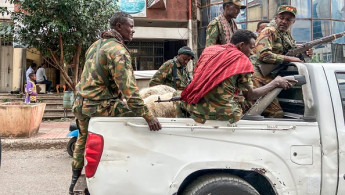Tigray rebels vow to pursue military advance in northern Ethiopia
Tigrayan rebels said on Tuesday they intended to advance further into neighbouring regions of northern Ethiopia but were still open to peace talks after fighting erupted last week and put paid to a five-month-long truce.
The government of Prime Minister Abiy Ahmed and the Tigray People's Liberation Front (TPLF) have each blamed the other for unleashing the renewed hostilities in areas bordering the southeastern tip of Tigray.
"We are fighting a defensive war," TPLF spokesman Getachew Reda said at a press conference broadcast online by the local Tigrai TV channel, adding: "We will remain open for any negotiations".
Residents as well as diplomatic and humanitarian sources have said that in recent days TPLF fighters have pushed about 50 kilometres (30 miles) south from Tigray into Amhara as well as to the southeast into Afar, sending many people fleeing.
The fresh combat has shattered a truce announced in late March and cast a shadow over international efforts to try to end the nearly 22-month conflict in the north of Africa's second most populous country.
Access to northern Ethiopia is severely restricted and it is not possible to independently verify the situation on the ground or the claims by the warring sides.
"We have defended our positions and we are now launching a counter-offensive," Getachew said.
"Abiy keeps making miscalculation after miscalculation, he keeps sending reinforcements and we'll continue to neutralise (them) and that will take us probably deeper and deeper into Amhara region".
Abiy's government announced Saturday that federal forces had pulled back from the town of Kobo to avoid "mass casualties".
Getachew said Tuesday a significant part of the North Wollo zone in Amhara was in rebel hands although the TPLF did not want to control the area.
He also accused the Abiy government of hoodwinking the international community into believing it was "serious about peace" and said the rebels had no option but to protect their "safety and security".
In response, the Government Communication Service said: "The federal government is still committed to the peaceful resolution to the conflict that was once again initiated by the TPLF terrorist group".
A local NGO active in Afar, the APDA, said on Twitter it had counted about 18,000 people displaced by the recent fighting in the region, mainly women and children, and that roads in one area were "clogged with fleeing people".
It said the TPLF was apparently advancing towards Keliwan, a town in Afar to the direct east of Kobo, and that people were evacuating.
The war has killed untold numbers of civilians and left millions in need of humanitarian aid across the north.
Since the latest combat flared, the international community has issued appeals for restraint, including from UN chief Antonio Guterres and the African Union, which is leading the drive for peace under Horn of Africa envoy Olusegun Obasanjo.
Guterres' spokesman Stephane Dujarric confirmed last week that he had spoken to Abiy as well as TPLF leader Debretsion Gebremichael to call for an immediate cessation of hostilities "as well as the creation of conditions to restart an effective political dialogue".
Since June both warring sides had evoked the possibility of peace talks, with Debretsion disclosing last week that "two rounds of confidential face-to-face" meetings with top civilian and military officials had taken place, the first acknowledgement by either side of direct contracts.
The rivals have been at odds over who should lead negotiations, with Abiy's government saying Obasanjo should broker any dialogue while the TPLF wanted Kenya's outgoing President Uhuru Kenyatta to mediate and has also called for the restoration of basic services to Tigray.
The March truce had allowed the resumption of international aid convoys to Tigray that had been halted for three months, while the region remains without access to basic services and struggling with food and fuel shortages.
Abiy, a Nobel Peace laureate, sent troops into Tigray to topple the TPLF in response to what he said were rebel attacks on federal army camps after months of tensions with the party that dominated Ethiopian politics for three decades until he took power in 2018.
The TPLF mounted a comeback, recapturing most of Tigray in June 2021 and expanding into Afar and Amhara, before the fighting reached a stalemate.





 Follow the Middle East's top stories in English at The New Arab on Google News
Follow the Middle East's top stories in English at The New Arab on Google News


